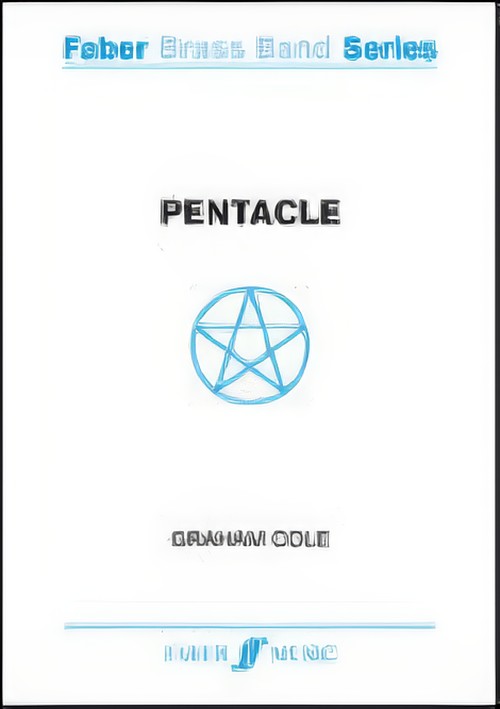Results
-
 £59.95
£59.95PAGEANTRY (Suite) (Brass Band Set - Score and Parts) - Howells, Herbert
Score & Parts. National Championships of Great Britain Area Test piece 2017 - Championship Section. Recorded on Polyphonic QPRL040D Pageantry
Estimated dispatch 7-14 working days
-
 £85.00
£85.00PENTACLE (Brass Band - Score and Parts) - Cole, Graham
2009 National Championships Area Qualitying Contest - 1st Section.It is a five-movement work, played without a break. The Pentacle is an image of an up-right five-pointed star drawn inside a circle with a single continuous line making the five points equally spaced. Traditionally, each of the five angles has been attributed to the five metaphysical elements of the ancients. These provide the titles for the five sections of he piece: Earth (representing stability and physical endurance), Wind (representing intelligence and the arts), Fire (representing courage and daring), Water (representing emotions and intution) and Quintessence (which represents the All and the Divine spirit).Duration: 13.00
Estimated dispatch 7-14 working days
-
 £30.00
£30.00PENTACLE (Brass Band - Score only) - Cole, Graham
2009 National Championships Area Qualitying Contest - 1st Section.It is a five-movement work, played without a break. The Pentacle is an image of an up-right five-pointed star drawn inside a circle with a single continuous line making the five points equally spaced. Traditionally, each of the five angles has been attributed to the five metaphysical elements of the ancients. These provide the titles for the five sections of he piece: Earth (representing stability and physical endurance), Wind (representing intelligence and the arts), Fire (representing courage and daring), Water (representing emotions and intution) and Quintessence (which represents the All and the Divine spirit).
Estimated dispatch 7-14 working days
-
 £55.00
£55.00PRELUDE & JUBILATE (Brass Band Set - Score and Parts) - Barry, Darrol
2007 National Championships Area Qualitying Contest - 3rd Section.
Estimated dispatch 7-14 working days
-
 £74.95
£74.95SINFONIETTA - The Wayfarer (Ball) (Brass Band - Score and Parts) - Ball, Eric
2007 National Championships Area Qualitying Contest - 1st Section.
Estimated dispatch 7-14 working days
-
 £37.95
£37.95SINFONIETTA - The Wayfarer (Ball) (Brass Band - Score only) - Ball, Eric
2007 National Championships Area Qualitying Contest - 1st Section.
Estimated dispatch 7-14 working days
-
 £24.95
£24.95SNARING OF THE SUN, The (Brass Band Extra Score) - Roberts, Stephen
2015 National Championships Finals Testpiece - Second Section - Extra Score. The Graces of Love (Le Gratie d'Amore) is the title of a book published in 1602 by Cesare Negri, the famous dance master of the Milan court in the Renaissance. It contains numerous dance tunes and precise descriptions of courtly dances. It also includes the tune Il bianco fior (The White Flower) on which the first movement of the present piece is based. A vigorous dance in three-four, it leads to an acceleration and a sudden shift to an even meter towards the end. The second movement, calm and contemplative in character, features the tune Vaghe bellezze ... (Veiled Beauty ...). Widely spaced melodic parts surround two solos during which the tune is varied and developed. Finally, the third movement contains a saltarello with a hypnotic rhythm, ending the work with flair and gusto. Duration: 11:30
Estimated dispatch 7-14 working days
-
 £99.95
£99.95SNARING OF THE SUN, The (Brass Band Set) - Roberts, Stephen
2015 National Championships Finals Testpiece - Second Section. The Graces of Love (Le Gratie d'Amore) is the title of a book published in 1602 by Cesare Negri, the famous dance master of the Milan court in the Renaissance. It contains numerous dance tunes and precise descriptions of courtly dances. It also includes the tune Il bianco fior (The White Flower) on which the first movement of the present piece is based. A vigorous dance in three-four, it leads to an acceleration and a sudden shift to an even meter towards the end. The second movement, calm and contemplative in character, features the tune Vaghe bellezze ... (Veiled Beauty ...). Widely spaced melodic parts surround two solos during which the tune is varied and developed. Finally, the third movement contains a saltarello with a hypnotic rhythm, ending the work with flair and gusto. Duration: 11:30
Estimated dispatch 7-14 working days
-
 £25.00
£25.00THREE ANCIENT CUSTOMS (Brass Band Score) - Cole, R Huw
2012 National Championships Finals - Third Section. Huw Cole's three-movement work depicts the customs of Wales and the West of England. The traditions are couched in the movements titles: Cwrw Bach; Mari Lwyd; Wassail. The finale offers a grand climax in the festive spirit of a wassail, before transforming into a sea shanty in homage to Gloucester's dependence on the River Severn.
Estimated dispatch 7-14 working days
-
 £59.95
£59.95THREE ANCIENT CUSTOMS (Brass Band Set - Score and Parts) - Cole, R Huw
2012 National Championships Finals - Third Section. Huw Cole's three-movement work depicts the customs of Wales and the West of England. The traditions are couched in the movements titles: Cwrw Bach; Mari Lwyd; Wassail. The finale offers a grand climax in the festive spirit of a wassail, before transforming into a sea shanty in homage to Gloucester's dependence on the River Severn.
Estimated dispatch 7-14 working days
